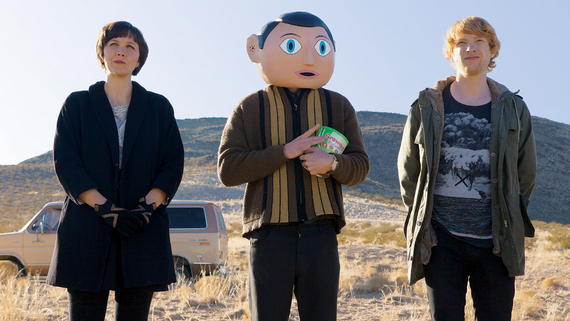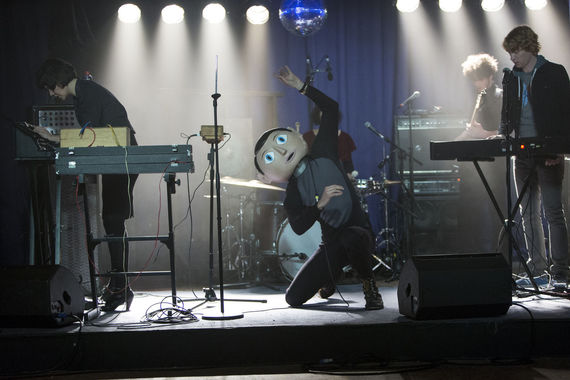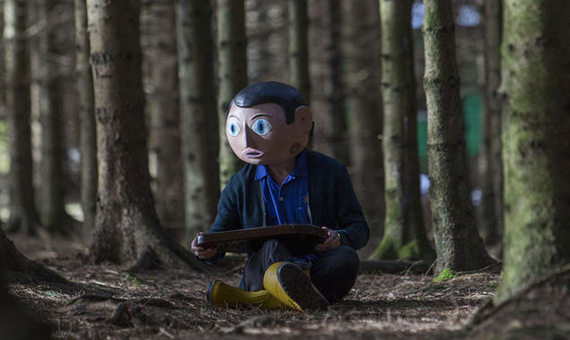We're told that in our digital future music will be created by computer algorithms. But could an algorithm make music anywhere near as weird and wonderful as Frank? Frank is the titular character of Lenny Abrahamson's touching and funny new black-comedy Frank, an ode to the irreplaceable nature of quirky, individual human creativity.
Coming out on DVD/Blu-ray December 9th, Frank premiered at the Sundance Film Festival earlier this year to rave reviews. The movie is inspired by the true story of Chris Sievey, a British musician and comedian who performed wearing a large paper-mâché head under the pseudonym Frank Sidebottom.
If you're seeking a cinematic antidote to our flattened-out, Big Data, crowd-sourced, mass conformist digital age, then take the time to see Frank. Frank is a paean to true creativity -- the kind of creativity that can only come from an individual.
Frank stars Michael Fassbender as the eponymous musician -- a mysterious, wildly talented singer-songwriter who wears a large paper-mâché head over his face at all times. Frank is supported in his musical efforts by a medley of eccentric band mates; these include nerdy keyboardist Jon (Domhnall Gleeson), surly theremin player Clara (Maggie Gyllenhaal) and troubled band manager Don (Scoot McNairy).
The story is told from the point of view of Jon (Domhnall Gleeson), a would-be keyboardist and song-writer who spends his days searching for poetic inspiration in his quiet seaside town, while posting random updates on social media about what sandwiches he's eaten, his humdrum home life and so forth.
One day while staring blankly out at the ocean, Jon witnesses a man being rescued from an attempted drowning. It turns out the man is the keyboardist for an avant-garde band with the unpronounceable name of "The Soronprfbs." Jon meets the band's manager Don (Scoot McNairy) and is invited to play with the band that night.
Jon is enthralled by the chaotic creativity of the band -- so different from his own dull existence- and in particular by the manic, oddly compelling performance of Frank, a figure wearing a large, round head with blank, staring eyes and a goofy, painted-on smile. Jon seems to make the right impression on Frank, and so Frank invites Jon to join the band at a remote country house in Ireland to record their next album.
Jon is over the moon with joy, convinced that being in close proximity to musical genius will finally unleash his own creativity. However he soon learns that the other band members are suspicious of him -- especially Clara -- because they think that he's a mediocrity only out to exploit Frank's talent.
Unbeknownst to them, Jon is also secretly videotaping the band's offbeat practice sessions (in which they find inspiration in things as diverse as bird calls, pouring water and slamming doors) and uploading them to social media, gaining them an online following.
The band is surprised to learn that they've been invited to perform at South by Southwest in Austin, Texas -- and Frank goes wild with joy, convinced by Jon that his music will finally find mainstream acceptance. The band travels to South by Southwest, where Jon makes the mistake of trying to make Frank compromise his music by creating more "likable" songs that will be more "accessible" to the audience.
The genial, trusting Frank works hard to comply, thrilled to unveil to his band-mates his "most likable song yet." However, things soon fall apart, with the band riven with dissension over Jon's attempts to make Frank's music more "likable," more "mainstream" -- and more dull.
Michael Fassbender is wonderful as Frank, drawing out a performance full of humor, pathos and manic intensity from behind the giant paper-mâché mask. Domhnall Gleeson, Maggie Gyllenhaal and Scoot McNairy are similarly sharp and funny, making the most of a witty script written by Jon Ronson and Peter Straughan and deftly directed by Lenny Abrahamson.
What's most touching is the central conception of the character of Frank. As Kyle Buchanan notes in Vulture: "Frank is so compelling in his totally forthright hiddenness that he's who all the other characters aspire to be." Frank is, in a sense, the least inhibited of anyone in the group -- and that may be why he's the best musician. As Frank says to Jon, unironically, "why cover anything up -- right?" Don further asserts that Frank is the "100 percent sanest cat I ever met."
Frank might hide behind a giant head, but he's the least cynical, most open-minded member of the band. He's willing to trust others and try new things in his music. He shares what all true artists share: a devotion to their art that makes them open up to the universe and take inspiration from the infinite variety of life -- and then have the discernment to shape that inspiration into compelling art.
A truly creative person can make art out of anything -- and Frank is able to make weirdly delightful music out of glass jars, straws, graters and just about anything he can get his hands on.
Inanimate objects are imbued by Frank with vivid personalities and rich inner lives. In a flash, Frank can imagine an entire life-story for a humble little carpet tuft, creating a charming song about the tuft's adventures, sufferings and triumphs ("lone standing tuft / defying the foot / is it luck that you're still standing?").
Frank possesses the mystic/creative ability to form an immediate bond and identification with the world around him and imbue it with story and meaning -- turning it into art in the process.
This is the kind of thing that still only be done by real people, not through the automated process of a computer.
There may come a day when computers will become billions of times more powerful and will run algorithms so sophisticated that they can synthesize all the accumulated history of human creativity and rehash it into something that the average person may mistake for original art -- but by that point the true artists will have moved on to new art forms that cannot be so easily imitated.
This has always been the process. When photography made realistic painting obsolete by the late 19th century, painting moved on to more stylized forms like Impressionism and Cubism while photography itself developed into the cinema -- an art form that still stubbornly resists complete computer automation. Our art forms of the future will likely be powered by even more powerful computer tools -- but their content will still be 100 percent human in inspiration.
The importance of human creation and imagination persist. They represent the hope for a civilized world designed by an individual human hand, and not simply generated by the anonymous ones and zeros of binary code.
Ultimately, poetic inspiration is a gift of nature -- and it cannot be copied or automated, no matter how much our digital titans may try.
As Don the band manager explains to Jon, "Sooner or later you'll get the feeling -- why can't I be Frank? ... Jon, there can only be one Frank."


